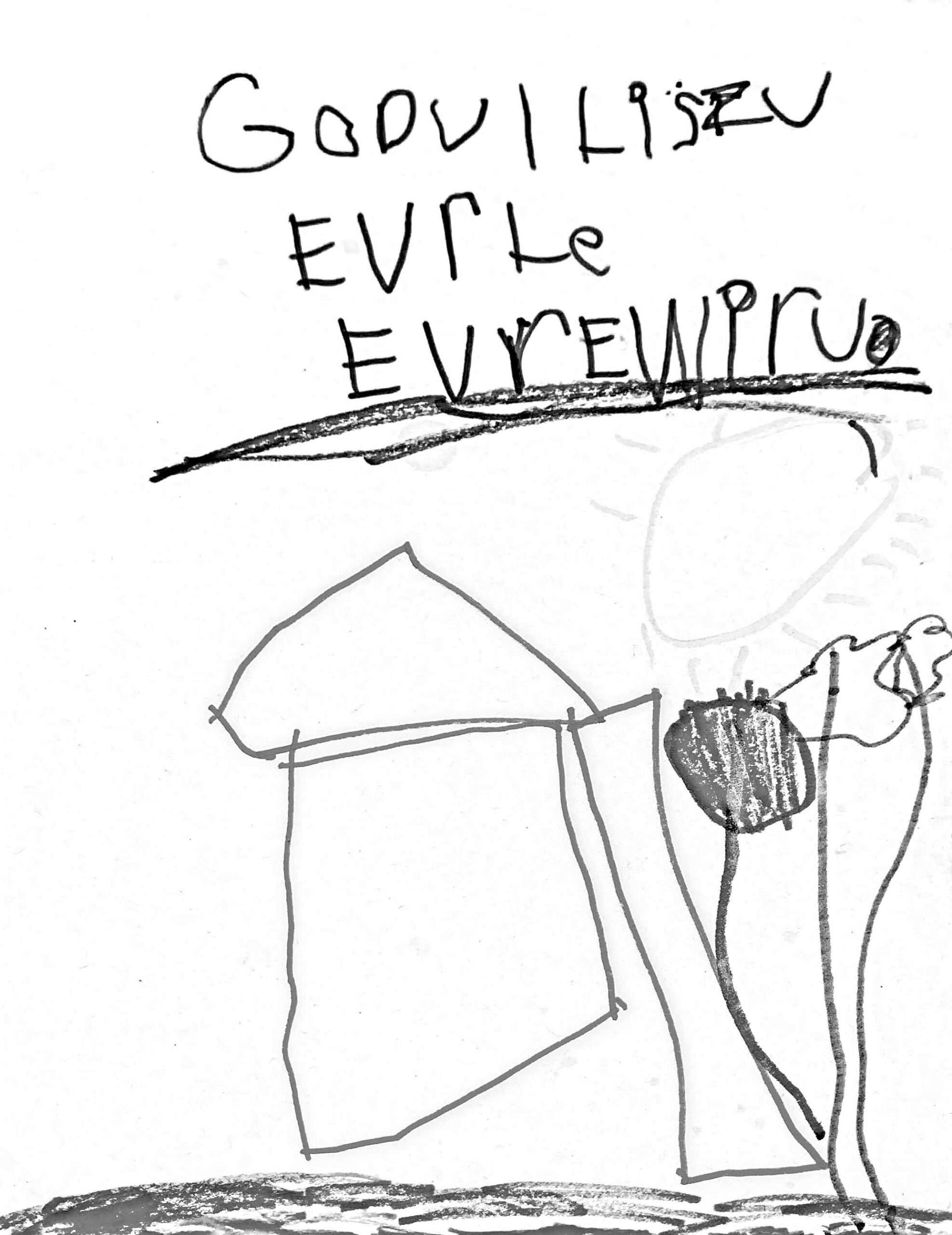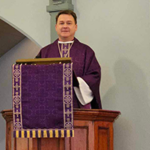This website uses cookies so that we can provide you with the best user experience possible. Cookie information is stored in your browser and performs functions such as recognising you when you return to our website and helping our team to understand which sections of the website you find most interesting and useful.
A Child's Quest for Anwers: Where Does God Live?







by the Rev. Canon Brad Hinton
I vividly remember a day when my theological training was put to the test in a decidedly unexpected way. The church doorbell rang several times impatiently. I walked toward the entrance with no expectancy; after all, church offices are not particularly exciting places on a typical weekday afternoon. I guessed that our visitor would be delivering a package, trying to sell us office equipment, or looking for financial or food assistance.
Through the glass I saw a woman holding the hand of a small child. Opening the door, I was nearly knocked over as the youngster sped past me and into the nave. Children often exhibit raw energy on playgrounds and near ice cream trucks, but I had never seen such liveliness to get inside a church. Whatever could be motivating such enthusiasm?
As his mother was apologizing for his abrupt entrance, I heard him running up and down the aisle, between rows, peeking behind the organ console, and galloping into the pulpit, all the while calling at the top of his lungs, “God, I’m here! I’m here to meet you, like I said I would God, you can come out now! Where are you?” All of this was happening faster than I could process. His mother was trying to explain and while she did, the boy’s excitement morphed from anticipation into confusion, and then to full-blown sadness. In a matter of minutes, he sat on the chancel steps and began to cry. “I don’t understand, if this is God’s house, why isn’t God here?” As we moved to console him, his mother told me the astonishing story.
The two of them traveled past the church nearly every day, going to and from school. Strapped into his carseat in the back of the car, he took a keen interest in the church with its high, angled roof and soaring belltower. When he asked his mother about the building, she told him, “That is God’s house.” She thought her answer would satiate his curiosity. Just the opposite happened. Rather than satisfying his interest, her response filled his young mind with the possibilities of an encounter with the living God. “That’s where God lives?” he asked. He became quite animated and told his mom that he wanted to meet God. Several times she attempted to redirect him, but his idea became determined. He was so persistent that his mom started driving a different route to school. She hoped that the old adage ‘out of sight, out of mind’ would apply and that he would forget and move on. Wishful thinking! Her son informed her that he had spoken with God about all this and had promised God that he would come for a visit. At some point in this process, she gave into his demands and detoured into the church parking lot. I wish she had given me some advanced notice!
So, there we sat on the chancel steps, mere feet away from the altar where the presence of the incarnate deity is celebrated and made real each week — two adults in a quandary and a child whose first religious pilgrimage was not at all what he expected. I attempted to console him and assure him that although God could not be seen, God was still present. My impromptu treatise on the omnipresence of God was little consolation to a tyke who was looking for something localized, manifest, and personal. And as I sat and considered his desire, I realized that I had heard similar versions of the same confusion on the lips of hundreds of adults who wanted to know where God was during their personal struggles or in the struggles of others. “Where does God live?” is merely the children’s version of a nearly universal quest.
Children occupy a unique place in the community of believers. Unencumbered by years of education and experience, the directness of their inquiries can be a source of laughter and wonder. One youngster was trying to understand what his parents had told him about the death of his grandfather. They told him that Pop-Pop had gone to heaven to live with Jesus. When he asked where heaven is, they pointed upward to the sky. Weeks later he asked to see me. When I sat down with him, he was concerned about the well-being of his grandfather and wanted to know if his Pop-Pop was safe with Jesus. “Yes, of course he is!” I exclaimed. “So, he won’t fall through the holes in the clouds?” he asked. His concern was so real and beautiful that I easily suppressed any inclination to chuckle. God being “up there”, “in heaven”, and “beyond the sky” are all popular in the vocabulary of children and adults. But there are some kids whose insights about where God lives are remarkable and telling. There have even been a few times when their words gave me goosebumps.

in the Episcopal Church in Delaware.
One discerning four-year-old told me that, “I used to know where God lives but that was when I was young; now I can’t remember.” Indeed. Forgetfulness of the presence of God in our lives is a sort of spiritual amnesia that afflicts us all. Perhaps that is why anamnesis (remembrance) is key to our Eucharistic worship. One young upstart told me, rather plainly, “We don’t know where God is, but God knows where we are.” Perhaps that was what the biblical passage means, “we walk by faith and not by sight.”
Another child shared with me what I wish I had been able to articulate to the earnest youngster from years ago, “God lives wherever there is love.” When I asked her how we know where love is, she said, “That’s silly — love is everywhere because God is everywhere; all we have to do is love too.” Perhaps children could become our resident theologians.

[editor’s note: this article first appeared in the Fall 2021 edition of the Delaware Communion Magazine]

Brad is the canon to the ordinary for the Episcopal Church in Delaware. He has served the Church in various capacities over the past 30 years. Most recently, he served as the rector at St. David’s Church in Wilmington. bhinton@delaware.church






